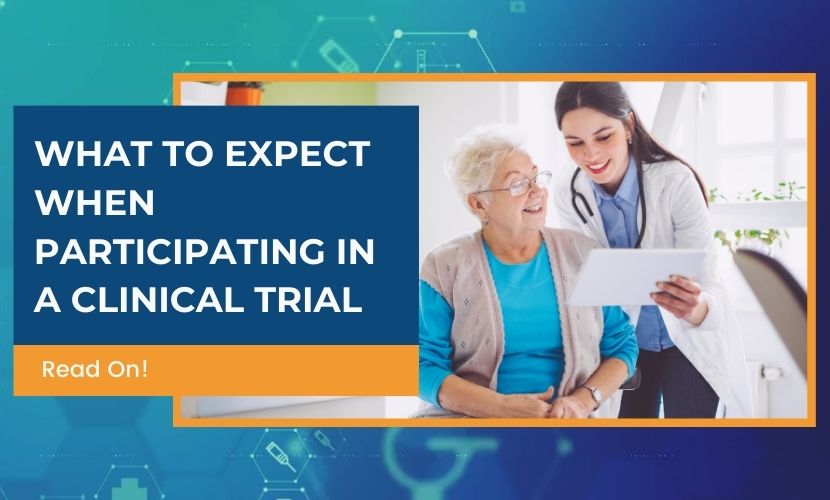What to Expect When Participating in a Clinical Trial

Clinical trials are research studies that test the safety and effectiveness of treatments for diseases and conditions in people. Some study medicines or devices, while others focus on surgical procedures or behavioral interventions. Clinical trials also test whether a procedure can diagnose a disease better or earlier than existing tests.
Clinical Trial Phases
Clinical trials that focus on medicines or devices typically occur in four phases. In some cases, a Phase 0 study is performed. This phase aims to identify issues with a small number of patients very early in the study.
Phase I
In Phase 1, researchers ask whether the intervention is safe. Healthy volunteers are usually enrolled in this phase.
Phase 2
In Phase 2, the effectiveness of the treatment works is measured. People with the disease or condition are typically enrolled.
Phase 3
In Phase 3, the number of volunteers is increased, and the new treatment is compared to others already commonly used.
Phase 4
In Phase 4, the new treatment is available to all patients. Medical professionals are using the treatment at this point, but the effects are still monitored.
Volunteers are needed for Phases 1-3 of a clinical trial. Clinical trials help researchers learn things that cannot be learned in a laboratory. But what are the benefits of clinical trials to the volunteers? Here, we explore why volunteering for a clinical trial can benefit you, what it’s like to participate in a clinical trial, and how to find a clinical trial that’s right for you.
Benefits of Clinical Trial Participation
In addition to researchers, volunteers themselves experience benefits from participatory research. Patient involvement in trials contributes to a greater understanding of disease, conditions, and treatments, and, therefore, many volunteers choose to participate based on the goal of contributing to the greater good. However, there are many other benefits that volunteers experience from participation.
Access to Cutting-Edge Treatments
People who volunteer for clinical trials gain access to innovative treatments and receive personal attention from leading medical experts. These treatments could be better than the best currently available.
Education
Volunteers in clinical trials receive detailed information about the disease or condition being studied. Because clinical trials often study a new treatment compared to an existing one to determine if it is as good or better, study organizers teach volunteers how these treatments work and their possible benefits.
Low or No-Cost Testing
Clinical trials often provide advanced testing at no cost, the results of which, in many cases, could be shared with your primary care physician at your request.
Compensation
People who volunteer for medical trials may also receive compensation for participating. This can be in the form of financial compensation for your time and funds or vouchers for travel or meals.
Enrolling in a Clinical Trial
Finding a Clinical Trial
Several websites can help you identify relevant clinical trial opportunities. Clinicaltrials.gov, for example, is a government website that helps you find clinical trials around the world. You can search by condition or disease, type of treatment, and location of the study. You can also find studies enrolling healthy volunteers for clinical trials in the early stages of development.
Clinical trial recruitment may involve organizations that specialize in organizing studies. Wake Research, for example, runs trials in multiple states on many health conditions. They coordinate the enrollment of healthy individuals and people with specific diseases and conditions. You can search by condition or disease and fill out a simple form to get more information and to determine eligibility.
Clinical Trial Eligibility
To join clinical research as a volunteer, you do not need medical insurance, but you may need to meet certain health requirements to be considered. Each clinical study clearly outlines the types of people who can be enrolled.
Eligibility requirements could include age, sex, and disease or condition. You may also be required to have access to email or transportation to a clinical trial site like a medical center. A screening visit is typically performed where clinical trial staff will interview you and possibly perform tests to determine whether you meet the requirements of their study protocol.
Trial Participant Experience
Research study enrollment is a carefully controlled process to make sure all participants are properly informed of what to expect and qualified to enroll. From a trial participant perspective, experiences will vary depending on the type of study but typically include:
Baseline Visit
Information is typically collected on your health. This information could include vital signs, blood work, or urine tests.
Study Visits
Clinical trials can take days to years to complete. During this time, you may be required to visit a study site periodically, like a medical center, where you will be monitored and may receive study medicines. You may continue taking medicines between visits or record your experiences in a diary.
End of Study Follow-Up
At the end of the study, you will return all unused medicines and may receive follow-up care. In some cases, you may be asked to continue in an extension of the study.
Uncertainties and Risk: Ensuring Participant Safety
When you enroll in clinical studies, your safety is a high priority. Strict methods or protocols are in place to ensure the safety and ethical conduct of the study. Ethical conduct means respecting your rights, including ensuring that you consent to all procedures and medication and protecting your privacy.
All studies funded by the federal government, for example, are reviewed by an Institutional Review Board (or IRB) that is composed of at least five people, including:
- One scientist
- One non-scientist
- One person unrelated to the study who can objectively review the study
The remaining members can be medical professionals, patient advocates, chaplains, or community professionals.
The IRB or other safety review groups aim to review the study design and progress, which can be stopped early if there are safety concerns. A trial can also be stopped early if the researchers have sufficient information to form conclusions about the study. Likewise, volunteers have the right to withdraw from the study at any time.
Patient research involvement is needed to improve healthcare, but it also benefits the volunteers themselves. Choosing to participate in medical research is a personal choice. Clinical trial organizers are obligated and motivated to provide you with all the information you need to make an informed decision.
Interested in joining a study or want to learn more? View a list of our currently enrolling studies.


